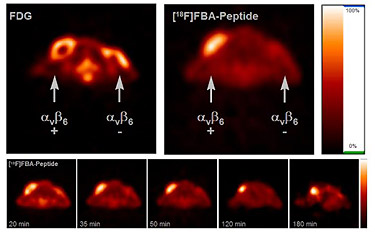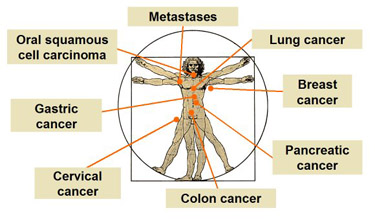 |
Targeted Molecular Imaging
Molecular imaging is the visualization, characterization and measurement of biological processes at the molecular and cellular levels in humans and other living systems. The Sutcliffe lab focuses its research on the development of targeted molecular imaging agents for in vivo applications with PET. Research involves the design, synthesis and in vivo evaluation of targeted radiolabeled peptides. |
 |
Molecular Targets
The molecular targets of interest are predominantly cell surface receptors. The over-expression of many cell surface receptors has been associated with many different disease states. The Sutcliffe lab is interested in the integrin family of receptors. Integrins are cell surface receptors involved in numerous cell-cell and cell-extracellular matrix interactions.
One particular integrin of interest is alpha(v)beta(6). Expression is low or absent in nonpathologic tissues. It is upregulated in multiple types of cancer and often highest at the invasive front. Specifically, alpha(v)beta(6) is significantly upregulated in pancreatic, breast, cervical and colon cancer, as well as over 90% of oral squamous cell carcinoma. Furthermore, expression of alpha(v)beta(6) correlates with development of metastasis in gastric cancer, is linked with a dramatic reduction in survival from colon cancer and is reported to promote both the survival and invasive potential of carcinoma cells. |